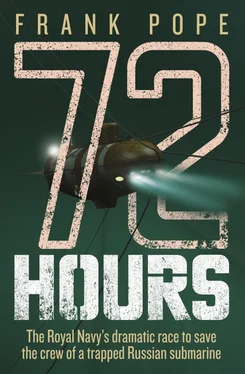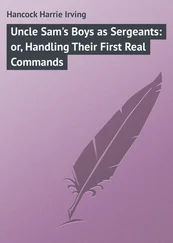Van Horn badly wanted to get to those men. Not only had he spent years of his career on nuclear submarines – and qualified as an Executive Officer – but he’d always worked with craft that were involved in rescue operations. There weren’t many submarines that could act as motherships for rescue submersibles, but he’d served on two. Equipped with the right onboard chambers and hatches, they were able to transport rescue submersibles to an accident site and take delivery of sailors from the distressed craft without any support from the surface.
But the bulletins on ISMERLO as he left were not sounding good. Thanks to all the delays, the Australian oil exploration ship was now regarded as the best hope for the trapped submariners.
Ominously, the principal scientist from a UK defence contractor called Qinetiq, was on the message board offering to analyse the crew’s chances of survival if they attempted a Rush Escape. Even if they’d been equipped with the latest survival suits with buoyancy, breathing apparatus and protection from the near-freezing water of the depths, the chances of survival coming up from that depth would not be good. Two hundred and ten metres was beyond the design limit of the suits, but not by much. As the scientist pointed out, with timescales for rescue looking very tight, it was worth projecting if such a drastic solution might result in a lower loss of life.
Saturday, 6 August
SS + 43 h 30 mins
00.00 UK – 03.00 Moscow – 12.00 Kamchatka
AS-28 , 210 metres beneath Berezovya Bay
Just past midday, the Russian Navy’s Pacific Fleet spokesman announced that AS-28 had now been towed for 90 metres.
On the seabed, Slava Milachevsky lay half frozen in the forward compartment, his head pounding and his lungs labouring. He had to strain to hear what the voice was saying on the underwater telephone. His hearing was fading as the level of carbon dioxide in his blood crept slowly upwards.
Surface vessels were dragging grappling hooks through the water to try to clear the obstructions and free the submersible, he was told. AS-28 must report when one of them made contact with the hull. But aside from occasional clangs – presumably from the hooks striking somewhere on the huge flank of the array – there had been no sign of them whatsoever. At one point the Kozmin operator had called excitedly, saying that a hook had caught. But AS-28 never moved. Whatever the grapple had snagged was not their steel coffin .
The Pacific fleet’s media arm was not the only one relying on comforting deceptions to keep morale high. Sergei Belozerov – the 34-year-old mechanic in charge of the engine room – had been put in charge of dispensing the only food on board, the dry crackers. At breakfast, lunch and dinner times, he would haul himself upright out of the huddle and hand each man a cracker with great ceremony, announcing that the handouts were being given compliments of Belozerov’s café.
But Belozerov’s other innovation was far more important to the men than crackers made almost inedible by their lack of saliva. For a Russian sailor the smoke break is a sacred ritual; a moment for pause, comradeship, contemplation and humour in their day of grind. Every few hours Belozerov would declare another smoke break, and the sailors would share out cigarettes. They took them hungrily, and took them to their mouths. After a couple of unlit, and unsatisfying hauls on the cigarette they began smelling, licking and even chewing the tobacco – anything to get a tiny taste of normality.
Saturday, 6 August
SS + 44 h 30 mins
01.00 UK – 04.00 Moscow – 13.00 Kamchatka
Petropavlovsk-Kamchatsky
Every time Yelena Milachevskaya closed her eyes she saw the cramped inside of the submersible with Slava inside, gasping for breath. When she opened them again she would be frantic with worry.
All night she had been answering the telephone, hearing different updates from the Naval headquarters. She’d got up to sit by the phone at six in the morning, but she’d stopped hoping for news. The estimates of the amount of breathable air changed so often that Slava’s father had gone to the headquarters in person to try to get to the truth.
Her sister was growing concerned. Yelena kept saying that she felt like her heart was failing, that she couldn’t feel her hands and feet. Her sister called headquarters once again, this time requesting that paramedics come with tranquillisers.
Five years before, the wives of those lost on the Kursk had sought solace in the same way. As the full horror of the tragedy started to leach out from reluctant Russian leaders, wives and families streamed out of the conference rooms and into the arms of medics. But not all injections were taken voluntarily. When the Deputy Prime Minister, Ilya Klebanov, was trying to sooth families at a tense meeting, Nadezha Tylik, the mother of one of the submariners, leapt to her feet and shouted, ‘You’re a swine! They’re dying down there in a tin can for $50 a month! And you don’t care! Do you have children? Do you?’
Soldiers surged towards her, but the woman continued her tirade. ‘I will never forgive you! Take your medals off and shoot yourself! Bastards!’ She had become surrounded, and the television footage clearly showed a female medic plunging a hypodermic needle into the woman’s thigh. The commotion had drawn security attention away from the Deputy Prime Minister, who suddenly found himself faced with another distraught sailor’s relative who had climbed up on to the podium. She had wrapped her hands around his neck and was trying to throttle him before his minders managed to pull her off.
But Yelena was in despair, not fury. When the paramedic arrived she took the drug without struggle, and was soon in a dazed, muted state, lying on her bed. She was still conscious enough to keep one hand on the telephone, but her eyes were glazed. Aside from her sister, the only person she’d let help with the twins was Slava’s old friend Artyom. He came around to help look after her and the kids.
She had not eaten since she’d first heard the news. The tranquillisers had transformed her panicked grief into a blank-eyed hollowness. Yelena’s brother in-law tried to gently push a spoon of broth between her lips, but most of it dribbled from the side of her mouth.
Yelena had not seen Slava since June, when they’d had a few days in the countryside together. The time before that they’d only been together for a day before he had to go back to work. Over and over she was imagining the moment when she would have to tell the girls that their Daddy was not coming home. She couldn’t think how she could ever say those words.
Maybe everything was her fault. Wordless guilt crushed down on her as she blamed herself for every quarrel they’d had in the last three years, and she cursed herself for having fought with him the last time he’d come back. There was no way for him to have known that she was only fighting with him because she loved him, because she wanted him to come home. How could he understand? For most of his life he was surrounded by men, but when he was home he was surrounded by girls – his girls, as they were always known in the text messages they sent to each other’s phones.
Occasionally, Yelena’s thoughts would brighten and she’d daydream of her handsome husband climbing up a ladder to a high window in which she was perched, and sweeping her off her feet, just as he’d done one day when she’d been in hospital and visitors had been barred. They were laughing together, she joking that he was too small to lift her. But every time the darkness would return, and Slava would start getting smaller and smaller, as he was crushed inside the impossibly tiny submersible.
Читать дальше












